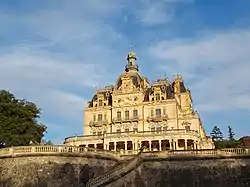Château d'Aubiry
The Château d'Aubiry is a château located in Céret (Pyrénées-Orientales), built between 1893 and 1904. Designed by the Danish architect Viggo Dorph-Petersen, the Château d'Aubiry was built for the son of French industrialist Pierre Bardou-Job. It was used as a filming location in 1960 for the movie L'eau a la bouche, has been protected as an official French historical monument since 2006.
| Château d'Aubiry | |
|---|---|
 The Château d'Aubiry | |
 Location within France | |
| General information | |
| Type | Château |
| Architectural style | Art Nouveau |
| Location | Céret, Pyrénées-Orientales (France) |
| Coordinates | 42°30′46.5″N 2°45′58″E |
| Current tenants | Private |
| Construction started | 1893 |
| Completed | 1904 |
| Technical details | |
| Floor area | 2,500 m2 (27,000 sq ft) |
| Design and construction | |
| Architect(s) | Viggo Dorph-Petersen |
Location
Although located in Céret, the Château d'Aubiry is nearer to the city limits of Saint-Jean-Pla-de-Corts than the town of Céret itself and can be seen from the road D 115, on the right side when coming from Saint-Jean-Pla-de-Corts and going towards Céret.
History
French industrialist Pierre Bardou-Job became wealthy selling rolling paper and decided to have a château built for each of his three children, all designed by the Danish architect Viggo Dorph-Petersen. The Château d'Aubiry was for his son Justin and was built from 1893 to 1904. Pierre Bardou-Job himself never saw it, as he died suddenly in 1892 just before the start of the construction.
The Château d'Aubiry was used as a filming location in 1960 for the movie L'eau a la bouche by French director Jacques Doniol-Valcroze. It has been protected as an official French historical monument since 2006,[1] and was offered for sale in 2011 with an asking price of 21 million Euros.